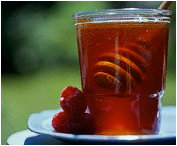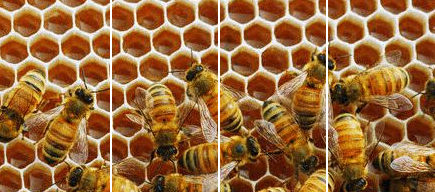 |
 |
Healthy and tasty: aphids and bees allied for our health
Honeydew, the good and healthy half-sister of honey, is the substance produced by the metabolism of aphids and other small insects, which suck the sap from the leaves of plants. Honeybees gather this sugary substance, which is processed and transformed into honeydew. It is very rich in minerals, potassium, phosphorus and iron.
The taste of this honey is a little less sweet than the honey derived from nectar and is characterised by hints of bark, ground and sugar: a spectacular and curious mixture on the tongue (bitter, earthy, very sweet and very woody). The colour is very dark, sometimes tending to black. Honeydew is very dense, does notcrystallises and is characterised by the presence of minerals in quantities greater than other types of honey.
Honeydew is particularly appreciated by those engaged in sport; unfortunately, its close consonance with the functions of the nervous system, the health of the brain, the cerebral circulation and memory are underestimated. Actually, the lesser amount of glucose, fructose, maltose and sucrose associated with greater amounts of amino acids, minerals (manganese, zinc, cobalt, sulphur, phosphorus) allows a lighter absorption modulated by the brain and the nervous system. Well then, the honeydew sweetly feeds, shelters and supports the nervous system without the energy shock of other honeys and even more of sugar
and various natural stimulant substances, such as damiana, ginseng, eleutherococcus, guarana, royal jelly, which are also used to give "tone" to the mood and health of our head. The honeydew can therefore be regarded as the natural remedy for people who barely bear the energizers, despite having the need to restore energy in the brain and all related functions.
Honeydew is particularly suitable for anxious and stressed people, with nervous asthenia and loss of memory due to restlessness, an excessive study, the concerns, age and poor health: agitated students, the elderly convalescent, stressed managers, career and pregnant women subject to sudden changes of mood, exhausted people who cannot be "under the weather" and cannot afford outbursts
of rage. These ones, but also other characters, may support their brain and mental functions with honeydew.
From an energy point of view, the honeydew can be thought as the culmination of a transformation that is not starting from the plant seed, but from the sap, the "memory" of a plant and in which beneficial and viable substances move together with information and analysis of soil in which the plant is located. This may be seen as being very similar to the movement that occurs inside the
brain and which places the honeydew in close energetic and symbolic correlation with the organ that "commands" our life. This particular product can be found in herbalist, natural food and beekeeping
shops; 75% of it is made by a mixture of sugars (a precious 5% less compared to other honeys): glucose 30%, fructose 35%, maltose 7%, sucrose 2%, and by numerous amounts of other nutrients (minerals, organic acids, vitamins, etc..), and water 17-18%. The substances in the remaining 5% are the most important ones and justify the superiority of this honey, compared to
sugar, for the health of the brain: amino acids, proteins, organic acids, minerals and trace elements, and finally traces of vitamins, enzymes, flavourings, pigments, inibine, pollen and hormones. In short, honeydew is the height of healthy virtues of plants, obtained from the patient work of honeybees. Actually, half a kilo of honeydew requires the patient work of insects and bees on at least one million of leaves. The honeydew, besides being very useful for the brain and the metabolism of sportsmen, has an antiseptic, disinfectant and antimicrobial action.
Until the last century, the honeydew was used in surgery to disinfect wounds, sores and lacerations. According to many fans and researchers, this particular product may be a moderate laxative, a general re-balancer of the organism, an
antiacid for the stomach, and a digestive tonic. It adjusts the neurological tone, improves the ability of intellectual work, may stimulate the appetite, it calms down cough and asthma, increases urine secretion, stimulates heart contractions and increases the blood flow in coronary; honeydew is suitable for fighting hypertension and in case of arteriosclerosis. So once
again it is useful for the brain and related physiological functions. Honeydew has a regulatory action on the intestinal flora and menstrual cycles, increases the rate of hemoglobin in blood, fights Hypocalcaemia, does not provoke acidosis and acid mood, does not cause metabolic imbalance because it contains the vitamin B complex, enzymes and trace elements, does not cause
abnormal rise of glycaemia with consequent production of insulin, does not cause changes in the metabolism of fats with resulting overweight: in short, honeydew is a real natural wonder.
Even more than for the other honeyes, precautions must be respected concerning the organic origin of honeydew and the application of little aggressive treatments at the stage of production.
This precious food is subject to counterfeiting, mainly obtained by the addition of natural glucose and destrines (odourless, flavourless dusts derived from starch, and soluble in water). Therefore, it is advisable to buy honeydew under the brand name "Italian Honey" that should not be pasteurized,unlike the imported ones, and is protected by trademarks which attest the precise place of origin. Honeydew with an organic certification completes even better the characteristics of this product.
|
|
 |
|



